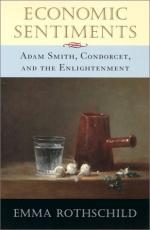|
This section contains 13,164 words (approx. 44 pages at 300 words per page) |

|
SOURCE: Rothschild, Emma. “Condorcet and the Conflict of Values.” In Economic Sentiments: Adam Smith, Condorcet, and the Enlightenment, pp. 195-217. Cambridge: Harvard University Press, 2001.
In this essay, Rothschild contrasts the received perception of Condorcet as an advocate of uniformity and universalism with his thought on conflict and diversity.
Cold, Descriptive Cartesian Reason
Condorcet has been seen, since his death in 1794, as the embodiment of the cold, oppressive enlightenment.1 He was for Sainte-Beuve “the extreme product and as it were the monstrous brain” of the “final school of the eighteenth century,” with its “orgies of rationalism”; he denied the diversity of human life; “he believed that he held the key to the happiness of men and of future races.”2 Condorcet's conception of the connectedness or universality of values, in particular, has seemed to epitomize the illusions of enlightenment thought. The celebrated chain of virtues in the Esquisse d'un tableau...
|
This section contains 13,164 words (approx. 44 pages at 300 words per page) |

|


